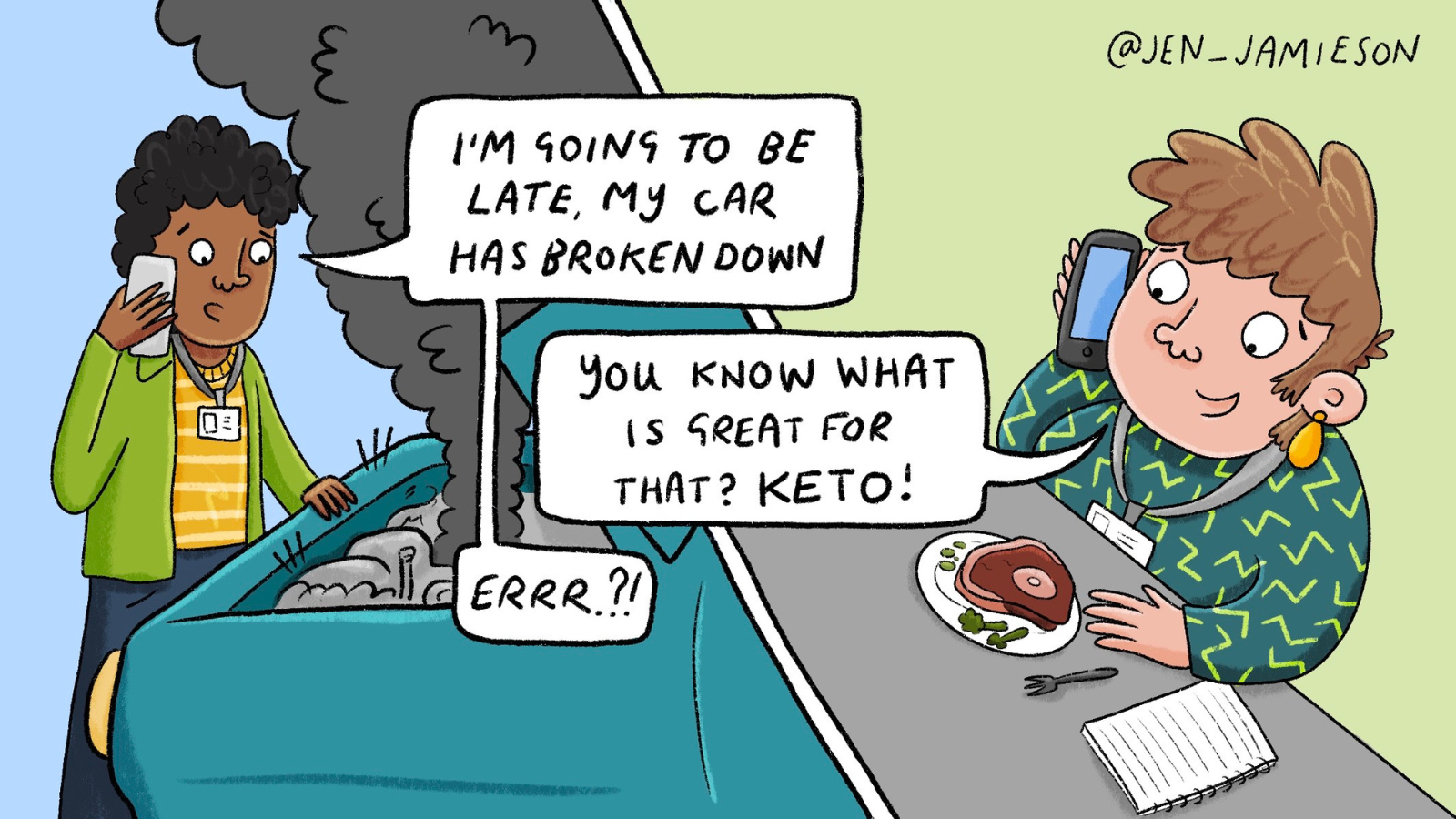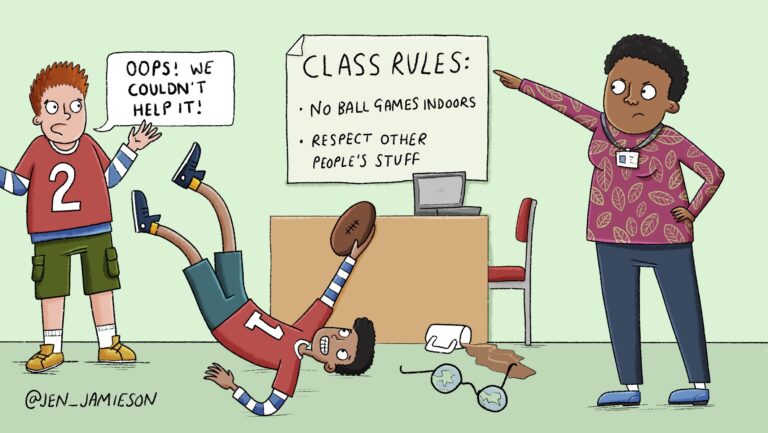Dear We Are Teachers,
One of the foreign language teachers at our school loves to talk about how the keto diet has changed her life. She will often hijack conversations with other teachers to talk about how keto could improve our health and solve seemingly all of our problems. This week, one of my students told me that she asked to go to the nurse for a headache. This teacher let my student go, but not before telling her that she could get rid of her headaches by going keto! I’ve complained to an administrator about this before, and she said she gave her a warning, but clearly she still feels comfortable prescribing this diet. Should I tell my admin again? It feels like tattling.
—Keep YoUr Keto to Yourself-o
Dear K.Y.K.T.Y.,
Your coworker is more than welcome to run her mouth about her own diet choices to other adults at school. Is it annoying? Yes. Is it boring? Yes. Will her armchair physicianship probably result in some social isolation with coworkers? Yes. With adults, this is OK. Because adults have fully developed frontal lobes.
But with students, this is inexcusable. Too many of us can pinpoint the comment we heard as teenagers that changed our relationship with food or our bodies (and not in a good way). It’s extremely inappropriate that your coworker talks about dieting in a prescriptive way with teenagers. Especially since their struggles with eating disorders more than doubled during the pandemic.
According to this article from UChicagoMedicine, the keto diet can cause “low blood pressure, kidney stones, constipation, nutrient deficiencies, and an increased risk of heart disease.” The article also notes that keto isn’t safe for people with conditions related to their pancreas, liver, thyroid, or gallbladder. Recommending this diet isn’t just harmful for this student’s relationship with food—it could be harmful to her health.
Personally, I would notify the parent of the student and your administrator. Your coworker is dispensing potentially dangerous medical advice. Who knows how many other students she’s advised inappropriately?
I usually advocate talking to another teacher before moving up the chain of command, but not this time. The teacher doesn’t need a heads-up from you—she already received a warning and chose harm anyway.
Dear We Are Teachers,
I teach high school history in Illinois, where we have mandated content standards on hate groups, the Holocaust, genocide, and ethnic cleansing. Recently, a student complained that they were uncomfortable reading an article that had a picture of a swastika in it. In response, the AP who oversees our history department asked us to do a huge overhaul of our curriculum and remove anything “uncomfortable” or “controversial,” including references to murder, death camps, people being harmed, and Nazis because “students can’t learn if they aren’t comfortable.” We tried talking to our principal, but he supported our AP. Do we escalate this and risk upsetting the administrative team?
—pedagogy or permissiveness?
Dear P.O.P.,
I’m sure you and your team are sensitive to the very real emotions and experiences of many of our students in response to the Israel-Hamas conflict right now. For children in Jewish communities who are already afraid, I can see this article being triggering.
On the other hand—and I should stress, unrelated to what I just mentioned— in recent years, “uncomfortable” has been weaponized by certain parents as a way of excusing children from learning information that they find incompatible with their political views. In my final year of teaching, many parents opted their children out of books using this word. Interestingly, these parents were fine with murder in The Great Gatsby and the teenage premarital sex in Romeo and Juliet and the bad words in Lord of the Flies, but not the same objectionable content written by Black authors about Black characters. I still have no idea why! (Sarcasm.)
Certainly, I think student comfort can be valid for teachers to consider in offering alternatives. But using it as a basis to eliminate mandated curriculum is a tough precedent to set.
Here’s what I’d recommend. First, approach your administrator with this request:
“As a department, we think it’s important to notify families that students will no longer be learning certain history standards. If end-of-course exams test students on content we’re eliminating, families need to know the implications in advance. Would you like us to write a draft and send it to you for approval?”
At this point, your admin should see the writing on the wall. Plenty of families will be angry when they realize their kids will miss out on important curriculum. Hopefully this is enough for your admin to walk back the decision.
If your administrator says no to notifying families and won’t walk back their decision, find a loud and influential parent and tell them what’s going on. Parents, I’ve learned, can get things moving in schools way faster and more powerfully than teachers can.
Best of luck to you. We don’t create a world without genocide (or racism, or violence, or hate) by pretending it doesn’t exist; we create it by equipping ourselves to identify these things and resist them.
Dear We Are Teachers,
The past few years of teaching have been rough on me and my physical and mental health. After having multiple panic attacks thinking of returning to school over the winter break, I met with my principal today to resign (school starts Monday). He was understanding but told me that in order to resign, I have to first submit my lesson plans and framework for the rest of the semester. I don’t want him to write a bad reference for me, but I honestly don’t think I can do this. What would you do?
—Just let me quit!
Dear J.L.M.Q.,
OK. I’m you. Let me think.
In the movie in my head where I’m a dazzling, fearless firebrand, I would tell your AP, “Oh, Peter, you and I both know there’s no way in hell I’m doing that, you silly old coot.” Then I’d laugh heartily, excuse myself, hop in my RAV4, and peel out of the parking lot.
But I know myself well enough to know that, in real life, I would—as you expressed—be concerned about maintaining a positive relationship with a professional reference. (I would also never peel out of anyplace because I’m an excellent and conscientious driver.)
Does this administrator need correcting on this weird, unethical exit ticket? Yes. Certainly, it’s easier for them if you provide lesson plans. But if it’s not in your contract, they can’t demand it.
But do you need to be the person to do that? Should you create more stress for yourself at a time when you’re trying to reduce it? Is this a high-stakes situation? No, no, and no.
My recommendation? Get your helpful colleague ChatGPT to write a semester’s worth of lesson plans for you. Don’t review them. Just paste into a Word Doc and attach it to an email. Then peel out of the parking lot (or don’t) and start taking care of yourself ASAP, my friend.
Do you have a burning question? Email us at askweareteachers@weareteachers.com.
Dear We Are Teachers,
Everyone on our 10th grade English team has a healthy level of sarcasm. But one coworker’s sarcasm comes off as just plain mean! If we’re late to a meeting, she says, “Wow—look who decided to grace us with their presence.” Once, when a colleague presented an ambitious idea for a project, she said, “All hail, Madam Overachiever!” I know it causes problems in her classroom, too. For example, she told me about a parent complaint she got recently about her telling a student, “Just stop. It’s like you’re in a parallel universe where the correct answer doesn’t exist.” When we’ve told her that her sarcasm veers into mean territory, she just responds that that’s her personality or that we’re too sensitive to understand her sense of humor. How do you tell a person to change a behavior that they believe is their personality?
—H.R.H. MADAM OVERACHIEVER


